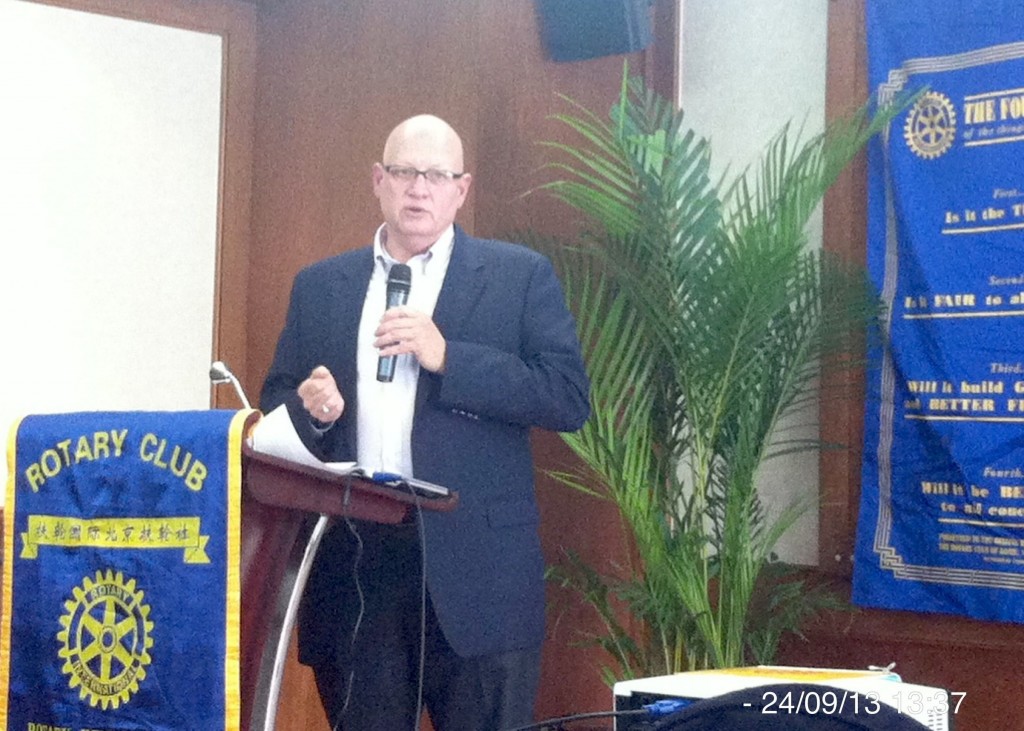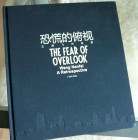On 24 September 2013 we welcomed James in our Rotary Club of Beijing. Follows his introduction on LinkedIn.
James McGregor is an American author, journalist and businessman who has lived in China for more than 25 years. He is chairman of APCO Worldwide, Greater China and a senior advisor to Pacific Epoch. A professional speaker and commentator who specializes in China’s business, politics and society, he regularly appears in the media to discuss China-related topics. He is also a contributor to The Atlantic.
McGregor is the author of the books “No Ancient Wisdom, No Followers: The Challenges of Chinese Authoritarian Capitalism” (2012) and “One Billion Customers: Lessons from the Front Lines of Doing Business in China” (2005). He also wrote the 2010 report “China’s Drive for ‘Indigenous Innovation’ – A Web of Industrial Policies.”
From 1987 to 1990 McGregor served as The Wall Street Journal’s bureau chief in Taiwan, and from 1990 to 1994 as the paper’s bureau chief in Mainland China. From 1994 to 2000, he was chief executive of Dow Jones & Company in China. After leaving Dow Jones, he was China managing partner for GIV Venture Partners, a $140 million venture capital fund specializing in the Chinese Internet and technology outsourcing.
In 1996, McGregor was elected as chairman of the American Chamber of Commerce in China. He also served for a decade as a governor of that organization. He is a member of the Atlantic Council, Council on Foreign Relations, National Committee on US-China Relations and International Council of the Asia Society. He serves on a variety of China-related advisory boards. He and his family live in Beijing.

James gave an eloquent and nicely packaged overview on the present political and business environment in China. Basically I share nearly all of his views. And oh well, he did not say anything I did not know myself (and also talk about in seminars, even in greater detail). But of course I am not “James McGregor”, I am just modest Gilbert. And as we say in Flemish: “You are never a prophet in your own land”.
He also referred the study “China 2030” that is covered pretty well in my book Toxic Capitalism. And that was written 18 months ago, and now people talk about it.
My Books
Details on Beijing’s action plan on clean air
As detailed in my book Toxic Capitalism, the issue of the air pollution in Beijing is serious but also complicated.
What happened during the run-up to the 2008 Olympics is another story; I was deeply involved in following that story, how Beijing was forced to take draconian measures – something that was only possible then and cannot be copied. I plan to write about that in detail one day. I talk about that in seminars I organize.
Car emissions are believed to account for one-third of PM2.5, a major air pollutant, in most congested areas in Beijing. Studies suggest a quarter of the pollutants in the city’s air comes from its surrounding areas.
Contrary to what some people believe abroad, the city government is pretty aware of the dramatic increase in air pollution and is now intensifying efforts to reduce the PM2.5. They have little choice as the population is too aware of the severity of the pollution and has even forced the authorities to start monitoring PM2.5.
See here the main points in the action plan. See the pdf for the full details and the sources (China Daily): 130903 BJpollution
Highlights – Beijing’s action plan on clean air
Five-year plan 2013-2017
- To reduce PM 2.5 density by 25% or more by 2017 with PM 2.5 density controlled to around 60 micrograms/m3, a 25% drop from 2012 levels.
- To slash 13 million metric tons of coal consumption over five years (more than 50%) based on 2012 levels; to reduce the proportion of coal used within the city’s total energy mix to below 10%. Coal consumption to be less than 10 million T by 2017.
- To completely eliminate the use of coal within the Second Ring Road.
- Vehicles from outside Beijing will be forbidden from entering the Sixth Ring Road unless with permission.
- To control private car ownership within 6 million by the end of 2017, from more than 5.2 million as of early 2013.
- Vehicle fuel use to be cut by at least 5% in 2017 from 2012 levels.
- One million old polluting vehicles to be scrapped from 2013 to 2017.
- A congestion charge would be levied mainly on vehicles in the downtown area and will be set out in the near future by the Beijing Environmental Protection Bureau and Beijing Commission of Transport.
- Public transportation in central Beijing to account for 52% of all trips in 2017.
- More than 65% of public vehicles to be clean energy vehicles by 2017.
- More than 60% of the city to be covered by green space by the end of 2017.
- Area of Beijing covered by water to increase 1000 hectares from 2013 to 2017.
Do note this is only part of the story. Not mentioned here are a series of other measures, including the improvement of car fuel (gasoline / diesel), e-vehicles, etc. See earlier posts.
The story of Charles J. Dukes (and his lady)
In the thousands of people I meet in Beijing (I have about 3,000 business cards), there are some colorful figures you learn to appreciate and who become good friends.
One is Charles, with whom I have long conversations on China, our ups and downs, on photography and whatever. And we can tackle very well a couple of beers. Charles is also a valuable contributor to my book Toxic Capitalism, through his pictures and his advice.
So I was impressed with part of his life story here:
http://www.sino-us.com/21/A-Vietnam-War-veteran-living-in-China.html
His wife, Wang Nanfei, is an exceptional lady, a remarkable artist, a bit shy and mostly too modest.
Here messages (edited) I had sent to Charles:
1 a.m. I’m sitting in my library. This black book is staring at me. What is this: “The Fear of Overlook”?
Damn! It’s Nanfei’s book.
So dark, so troubling; I don’t like the style. But, still, it fascinates me.
‘Kiss’ So simple, yet so deep. ‘Warm Sun’ only I understand?
Nanfei is not of this world. Her style sometimes hurts the eye; still, you want to look again: very special, troubling, unique.
She is deep: too much of a knife cutting you, but you reluctantly stay for more.
Man, you don’t know what you have on your side. Maybe the world will one day discover her. Her problem is that most of her work … you don’t want to look at it every day (OK, that is in my case). It’s provocative and hurting.
Her book (not showing the so-called “troubling” pieces)
She is a genius.
I knew it when I saw her the first time. I looked into her eyes and saw a whirlpool, lava turning around. A very special lady. Believe me, I might be over-complex, but I can see what others don’t. Let’s have a beer sometime. Take care my friend. Send her my thoughts.”
Gilbert – Beijing, 30 July 2012
Climate Panel Cites Near Certainty on Warming
See the full article: 19 August 2013 – By JUSTIN GILLIS, The New York Times:
http://www.nytimes.com/2013/08/20/science/earth/extremely-likely-that-human-activity-is-driving-climate-change-panel-finds.html?ref=justingillis
An international panel of scientists has found with near certainty that human activity is the cause of most of the temperature increases of recent decades, and warns that sea levels could conceivably rise by more than three feet (that like 1 m) by the end of the century if emissions continue at a runaway pace.
The scientists, whose findings are reported in a draft summary of the next big United Nations climate report, largely dismiss a recent slowdown in the pace of warming, which is often cited by climate change doubters, attributing it most likely to short-term factors.
The report emphasizes that the basic facts about future climate change are more established than ever, justifying the rise in global concern. It also reiterates that the consequences of escalating emissions are likely to be profound.
“It is extremely likely that human influence on climate caused more than half of the observed increase in global average surface temperature from 1951 to 2010,” the draft report says. “There is high confidence that this has warmed the ocean, melted snow and ice, raised global mean sea level and changed some climate extremes in the second half of the 20th century.”
The draft comes from the Intergovernmental Panel on Climate Change, a body of several hundred scientists that won the Nobel Peace Prize in 2007, along with Al Gore.
One more report, to add to the ones cited in my book Toxic Capitalism.
Driving a BMW in China but…
See here from China Daily 1 August 2013:
Quotable
“Driving a BMW but drinking polluted water – that is definitely not the modernization prospect we foresee.”
Zhou Shengxian, minister of environmental protection, was quoted by the People’s Daily as saying on Wednesday. Zhou said progress in building an ecologically responsible society can be guaranteed only by implementing strict environmental regulations and the rule of law.
Actually a nearly similar quote is already mentioned in my book Toxic Capitalism


